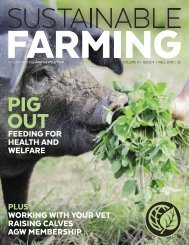Sustainable Farming magazine V5 I2 -- Summer 2020
News: COVID-19: Fight Or Flight; Cattle: Stay In Control; Regenerative Standards Opinion: Britain At Breaking Point? Cover feature: COVID-19 Fight Or Flight Cover feature: New Standard (Certified Regenerative by AGW) Technical: A Brave New World Technical: In Control Of Our Impulses Technical: New Approaches To Worming Technical: The Immune System Technical: Chicken On Grass Certification News: Desktop Audits Meet the Farmer: Lazy A Ranch in Texas
News: COVID-19: Fight Or Flight; Cattle: Stay In Control; Regenerative Standards
Opinion: Britain At Breaking Point?
Cover feature: COVID-19 Fight Or Flight
Cover feature: New Standard (Certified Regenerative by AGW)
Technical: A Brave New World
Technical: In Control Of Our Impulses
Technical: New Approaches To Worming
Technical: The Immune System
Technical: Chicken On Grass
Certification News: Desktop Audits
Meet the Farmer: Lazy A Ranch in Texas
You also want an ePaper? Increase the reach of your titles
YUMPU automatically turns print PDFs into web optimized ePapers that Google loves.
TIME TO REBUILD
NEW STANDARD
It’s easy to sound glib
in these unprecedented
times but farmers and
ranchers—and their
families and local communities—have
been
on our minds 24/7.
As the scale of the
COVID-19 pandemic
became clear, our first priority was the safety of
AGW staff and farming families in the program.
We halted all physical site audits and all staff
travel in March. It was the right decision because
the situation rapidly worsened.
When the nation shut down, countless farmers
who sold to restaurants, schools and other
institutions lost markets almost overnight. In
response, AGW took immediate action to help.
First, we sought to minimize the strain on farmers
and ranchers in the program—for example, by
suspending audit fee collection and extending
deadlines for compliance documents. With farms
unable to sell product, and many communities
seeing increasing dependence on food assistance,
we set up a nationwide campaign—'Help Farmers
Feed Hungry Families'—to connect farmers who
have excess supply with local food banks. In this
way, we can help get food to people who need it
the most while helping to keep farms in business.
When we learned that thousands of independent
farms were ineligible for federal support, we
joined over 20 other sustainable food companies
and advocacy groups (including Farm Aid and
the Sustainable Food Trade Association) to urge
Congress to ensure independent farmers could
access the $1.8 trillion emergency relief fund. We
approached key representatives to express our
anger that most federal funding has gone to large
commodity players instead. We will continue to
engage on behalf of independent farmers.
Our FMOC team has reached out to every certified
farm to assess their individual situations and
we’ve been sending out a weekly email to keep
everyone informed. We’ve regularly updated the
COVID-19 resources on our website with useful
information on direct marketing, grants and
funding, e-commerce, shipping and more, as well
as advice on emergency planning going forward.
While public safety is paramount, it’s in
everyone’s interests to maintain the integrity
of AGW programs and certified businesses. So
we have introduced new protocols for remote
auditing and will resume on-site audits as soon
as it’s safe to do so (see page 19). The situation
remains highly fluid: as I write, the infection rate
is rising again in many states.
But COVID has fundamentally exposed the
fragility of our centralized food system and many
consumers won’t forget the empty grocery store
shelves or the way independent farmers stepped
up to help. We will have an opportunity to rebuild.
When that times comes we must all be ready. In
the meantime, please let us know if we can help
navigate this ever-changing environment.
Sustainable Farming
Summer 2020
volume 5 • issue 2
cover price $6
sustainablefarming
mag.com
Editor: Peter Mundy
info@agreenerworld.org
Advertising:
advertise@
agreenerworld.org
The views expressed by
contributors to Sustainable
Farming are not necessarily those
of A Greener World. Every effort
is made to check the factual
accuracy of statements made in
the magazine, but no guarantees
are expressed or implied.
Material may not be reproduced
without prior written permission.
A Greener World
PO Box 115
Terrebonne
OR 97760
800-373-8806
@AGreenerWorld
@AGreenerWorld
@AGreenerWorldOrg
Sign up to our email list
agreenerworld.org
Read our blog at
agreenerworld.org/blog
Get early
access to
regenerative
markets—
without
being
organic
The Certified Regenerative by A Greener World
(AGW) label is now available to farmers and
ranchers.
Launched this summer, the new program offers
whole-farm assurance of sustainability, measuring
benefits for soil, water, air, biodiversity, infrastructure,
animal welfare and social responsibility.
While other regenerative labels exist, Certified
Regenerative by AGW is the only regenerative
label that ensures audited, high-welfare animal
management and slaughter.
“We’re delighted to launch our Certified
Regenerative by AGW standards, which promote
ecological balance through continual improvement
of healthy, thriving ecosystems from the soil up,”
says Emily Moose, Director of Communications
and Outreach. “Truly regenerative farming means
better treatment for workers and animals, and
healthier farm ecosystems with cleaner air and
water—which grow healthier food.”
“Open to all farmers, regardless of organic certification,
Certified Regenerative by AGW is the
only regenerative agriculture program that functions
as a management tool, helping producers meet
their own regenerative goals through an audited,
regenerative plan and meeting farmers where they
are and partnering on a journey of regeneration.”
Before introducing the new standards, AGW
carried out a comprehensive analysis of best
practices and the latest science on the regenerative
approach. Certified Regenerative by AGW farms
are audited each year to detailed standards, criteria
and principles that ensure comprehensive
verification of regenerative practices. The new
standards are rigorous, practical and achievable,
offering a common understanding of regenerative
production that delivers sustainability and meets
consumer expectations.
Interested? Contact your regional FMOC for more
information (see page 24).
ROTOFRANK
IN THE
NEWS …
ROUNDUP LAWSUITS
Bayer will pay up to $10.9 billion to settle
a number of lawsuits about the potential
carcinogenic effects of its glyphosate-based
herbicide, Roundup.
The German agrichemical giant acquired its rival
Monsanto in 2018 for $63 billion and has been
facing over 125,000 claims in the U.S. after a
California court issued the first ruling linking the
herbicide to cancer. The company continues to
deny any safety concerns: “We stand strongly
behind our glyphosate-based herbicides.”
DAMAGING PRACTICES
Scientists at Rothamsted Research UK have
definitively demonstrated that intensive farming
practices drain the soil of carbon, altering the
structure of soils’ microscopic habitat.
Writing in the Scientific Reports journal, they
say, “the shift from manure to ammonia and
phosphorous based fertilizers has caused microbes
to metabolize more carbon, excrete less polymers
and fundamentally alter the properties of farmland
soils when compared to their original grassland
state.”
NEW BROCHURE
A new consumer brochure is now available to
certified farmers and ranchers. Part of AGW’s
extensive promotional merchandise range,
the tri-folded consumer brochure describes
AGW’s third-party certifications using easyto-understand
information and eye-catching
images, and is designed to show customers
the wide-ranging benefits of AGW’s family
of certifications.
For farms and businesses selling AGW-certified
products. To order, see page 25.
BEE BRAIN IMPAIRMENT
Pesticides can impair brain growth in bumblebees,
warn scientists. Published in Proceedings of the
Royal Society B, researchers at Imperial College
London used micro-CT scanning technology
to show how parts of bumblebee brains grew
abnormally when exposed to neonicotinoid
pesticides during their larval phase, making them
poorer at performing tasks later in life. They argue
that direct exposure to pesticides through residues
on flowers should not be the only consideration
when determining potential pesticide harm.
2 • SUSTAINABLE FARMING • SUMMER 2020
SUMMER 2020 • SUSTAINABLE FARMING • 3




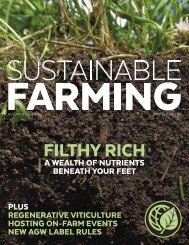
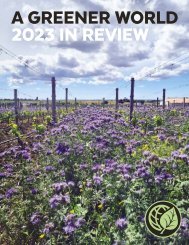
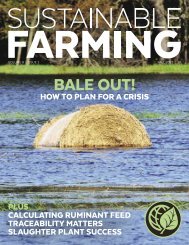
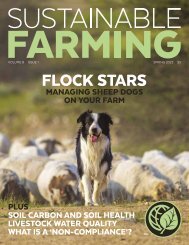
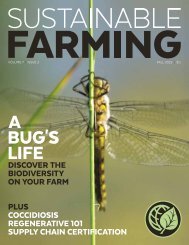
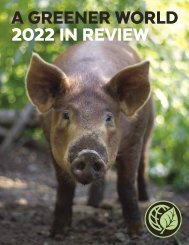
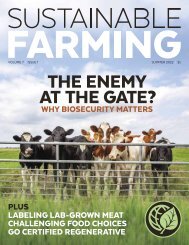
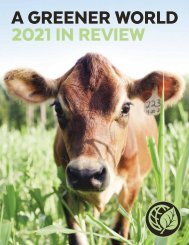
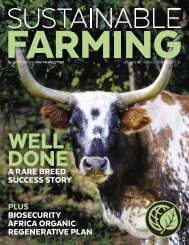



![SF Magazine V5 I1 -- Winter-Spring 2020 [SCREEN ONLY]](https://img.yumpu.com/63122871/1/190x245/sf-magazine-v5-i1-winter-spring-2020-screen-only.jpg?quality=85)
